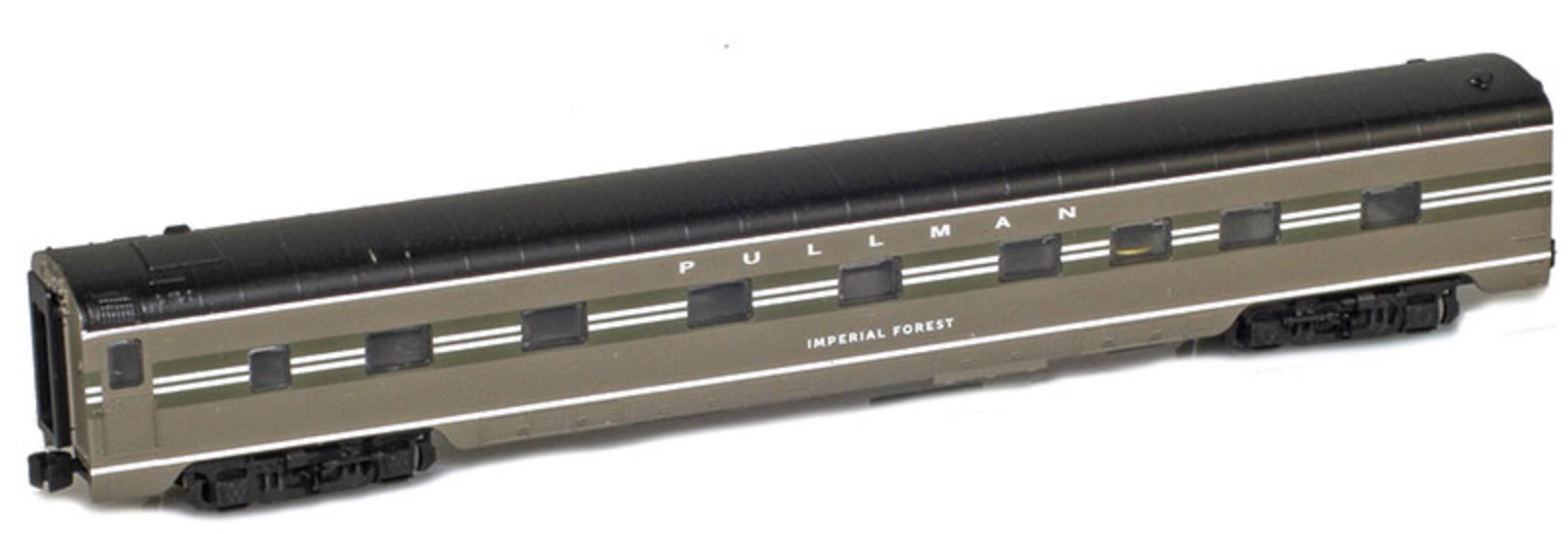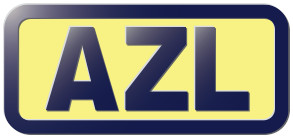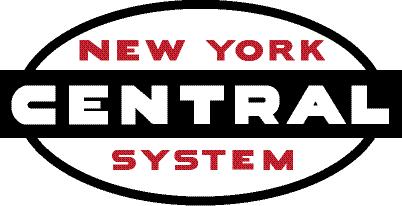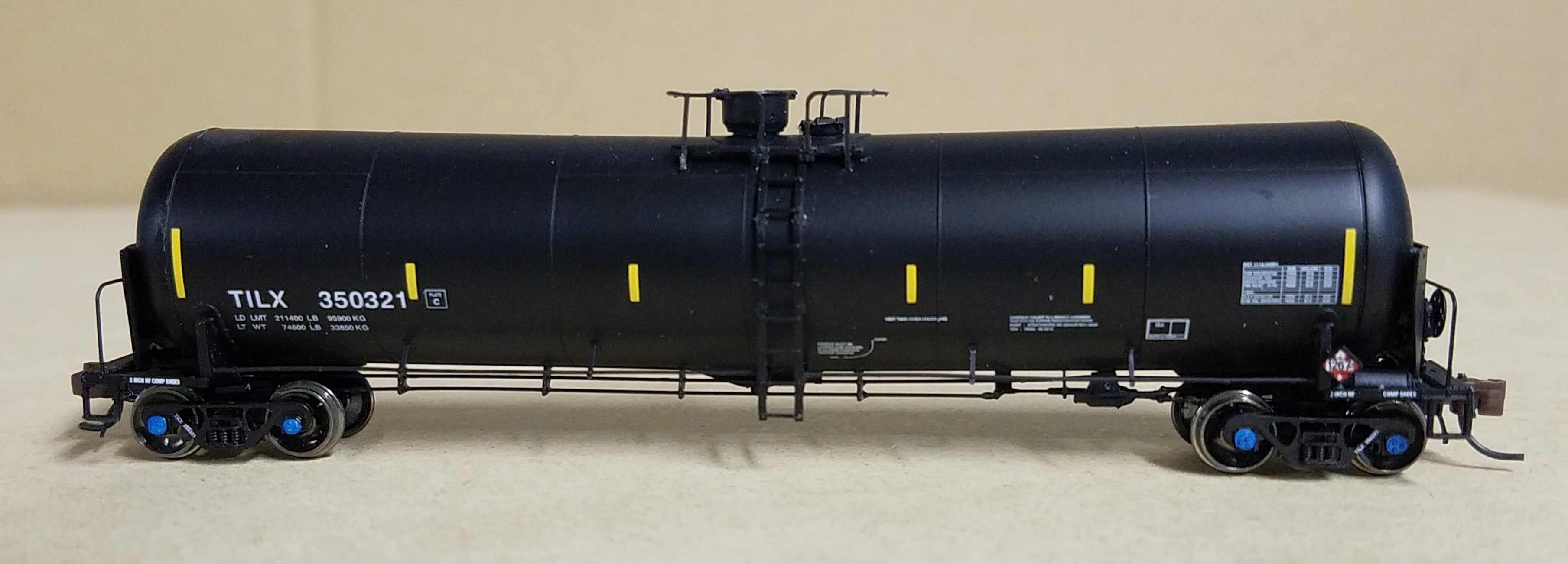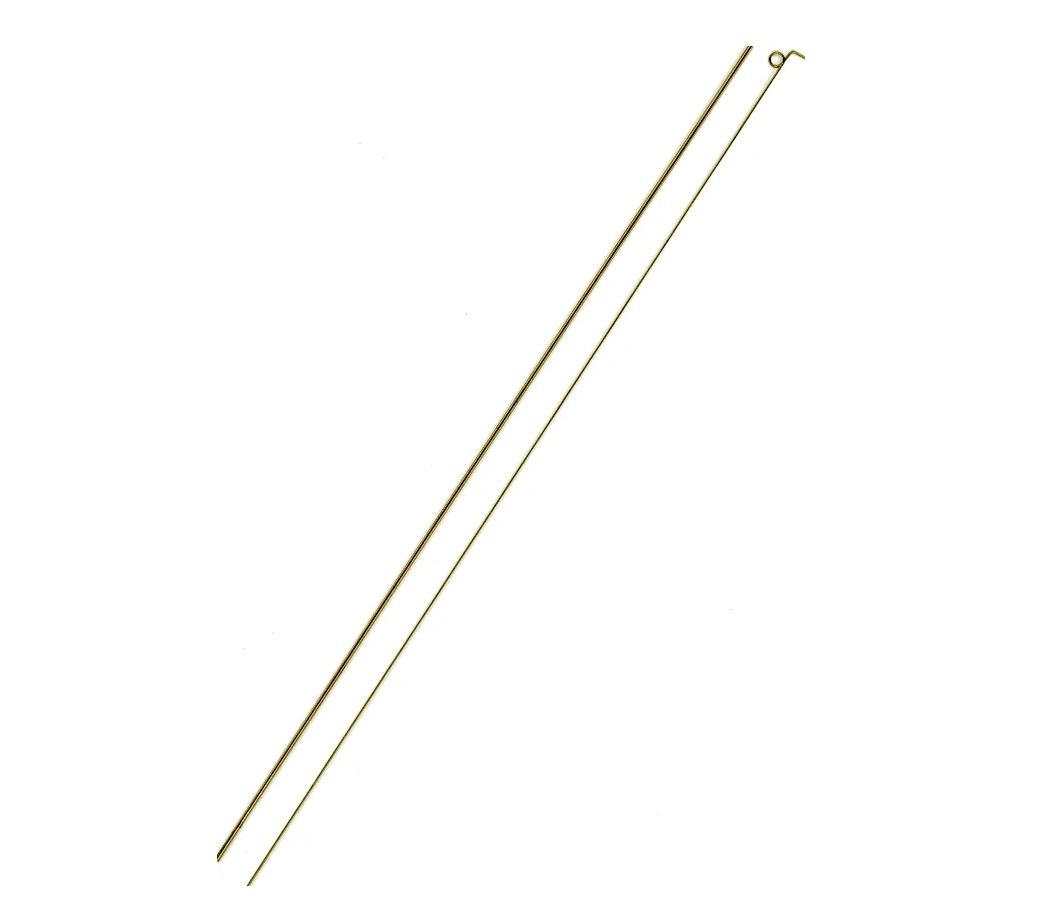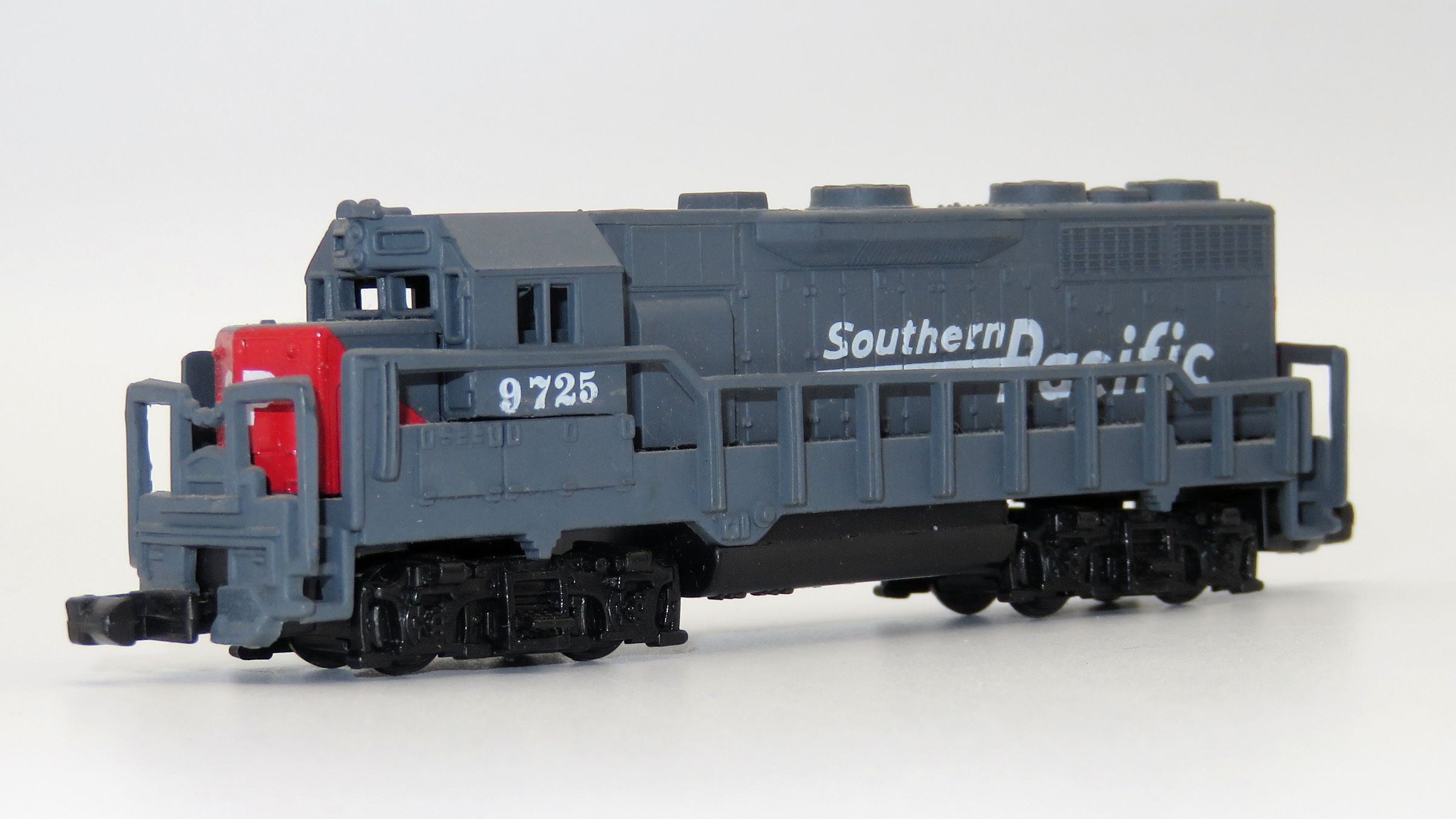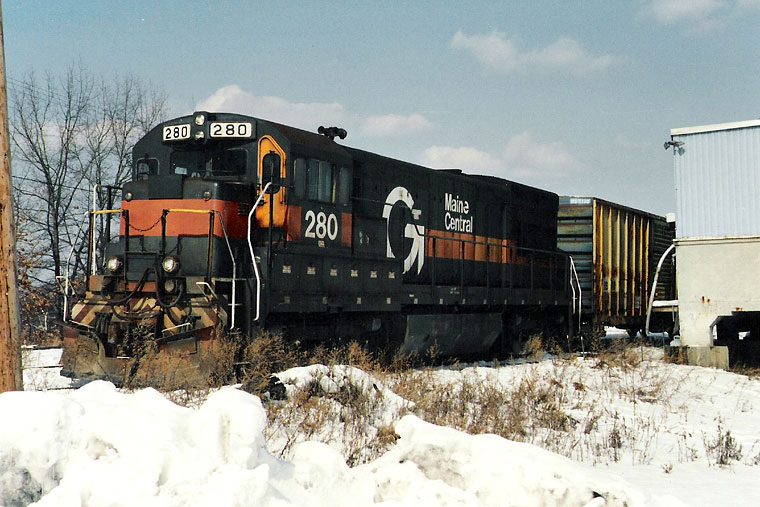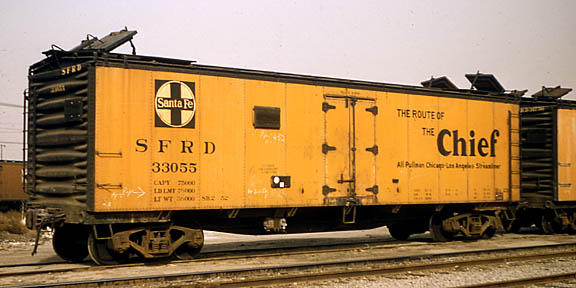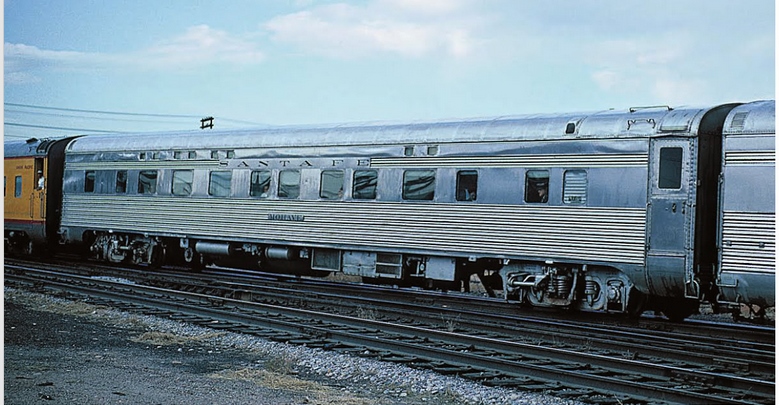Prototype History: The "Imperial" 4-4-2s are among the most popular designs in Lightweight passenger service. They have an excellent array of middle to top level accommodations, with 4 double bedrooms, 4 comfortable compartments and 2 drawing rooms.
The drawing rooms have evolved from the Heavyweight days. The restroom is arranged differently (note that most of the toilets are near the centerline of the car, where their chutes can clear the underbody gear mounted along the car edges.) In place of the section and sofa combo, a sofa and two armchairs provide day accommodations. At night, the sofa folds down into a traditional upper and lower. The third berth is a "Murphy bed" that folds down from a wall locker.
The compartments have a similar arrangement of sofa and chair; being, in effect, miniaturized drawing rooms. The bedrooms are similar again, with less floor space and no chair. The fundamental difference between a "single bedroom" and a "double bedroom" is that the single does not have an upper berth.
There are still a few shortcomings with this design. For example, the compartments and bedrooms still have the open toilets (postwar cars will have these enclosed in tiny restrooms). The compartments also have the prewar style small windows above the main windows. These were originally designed to give the upper berth a window view. However, in these cars, the berths are mounted laterally.
Still, these are excellent cars: requiring only detail refinements to achieve the long-sought perfection of the sleeping car. These versatile 4-4-2s are found on trains throughout the country.
The drawing rooms have evolved from the Heavyweight days. The restroom is arranged differently (note that most of the toilets are near the centerline of the car, where their chutes can clear the underbody gear mounted along the car edges.) In place of the section and sofa combo, a sofa and two armchairs provide day accommodations. At night, the sofa folds down into a traditional upper and lower. The third berth is a "Murphy bed" that folds down from a wall locker.
The compartments have a similar arrangement of sofa and chair; being, in effect, miniaturized drawing rooms. The bedrooms are similar again, with less floor space and no chair. The fundamental difference between a "single bedroom" and a "double bedroom" is that the single does not have an upper berth.
There are still a few shortcomings with this design. For example, the compartments and bedrooms still have the open toilets (postwar cars will have these enclosed in tiny restrooms). The compartments also have the prewar style small windows above the main windows. These were originally designed to give the upper berth a window view. However, in these cars, the berths are mounted laterally.
Still, these are excellent cars: requiring only detail refinements to achieve the long-sought perfection of the sleeping car. These versatile 4-4-2s are found on trains throughout the country.
Road Name History: The New York Central Railroad (reporting mark NYC), known simply as the New York Central in its publicity, was a railroad operating in the Northeastern United States. Headquartered in New York City, the railroad served most of the Northeast, including extensive trackage in the states of New York, Pennsylvania, Ohio, Michigan, Indiana, Illinois, and Massachusetts, plus additional trackage in the Canadian provinces of Ontario and Quebec.
The railroad primarily connected greater New York and Boston in the east with Chicago and St.Louis in the midwest along with the intermediate cities of Albany, Buffalo, Cleveland, Cincinnati, and Detroit. NYC's Grand Central Terminal in New York City is one of its best known extant landmarks.
1853 company formation: Albany industrialist and Mohawk Valley Railroad owner Erastus Corning managed to unite ten railroads together into one system, and on March 17, 1853 executives and stockholders of each company agreed to merge. The merger was approved by the state legislature on April 2, and by May 17, 1853 the New York Central Railroad was formed.
In 1867 Vanderbilt acquired control of the Albany to Buffalo running NYC. On November 1, 1869 he merged the NYC with his Hudson River Railroad into the New York Central and Hudson River Railroad. Vanderbilt's other lines were operated as part of the NYC.
In 1914, the operations of eleven subsidiaries were merged with the New York Central & Hudson River Railroad, re-forming the New York Central Railroad. From the beginning of the merge, the railroad was publicly referred to as the New York Central Lines. In the summer of 1935, the identification was changed to the New York Central System.
In 1968 the NYC merged with its former rival, the Pennsylvania Railroad, to form Penn Central (the New York, New Haven and Hartford Railroad joined in 1969). That company went bankrupt in 1970 and was taken over by the federal government and merged into Conrail in 1976. Conrail was broken up in 1998, and portions of its system was transferred to the newly formed New York Central Lines LLC, a subsidiary leased to and eventually absorbed by CSX and Norfolk Southern. Those companies' lines included the original New York Central main line, but outside that area it included lines that were never part of the New York Central system. CSX was able to take one of the most important main lines in the nation, which runs from New York City and Boston to Cleveland, Ohio, as part of the Water Level Route, while Norfolk Southern gained the Cleveland, Ohio to Chicago, Illinois portion of the line called the Chicago line.
At the end of 1925, the New York Central System operated 11,584 miles (18,643 km) of road and 26,395 miles (42,479 km) of track; at the end of 1967 the mileages were 9,696 miles (15,604 km) and 18,454 miles (29,699 km).
Read more on Wikipedia.
The railroad primarily connected greater New York and Boston in the east with Chicago and St.Louis in the midwest along with the intermediate cities of Albany, Buffalo, Cleveland, Cincinnati, and Detroit. NYC's Grand Central Terminal in New York City is one of its best known extant landmarks.
1853 company formation: Albany industrialist and Mohawk Valley Railroad owner Erastus Corning managed to unite ten railroads together into one system, and on March 17, 1853 executives and stockholders of each company agreed to merge. The merger was approved by the state legislature on April 2, and by May 17, 1853 the New York Central Railroad was formed.
In 1867 Vanderbilt acquired control of the Albany to Buffalo running NYC. On November 1, 1869 he merged the NYC with his Hudson River Railroad into the New York Central and Hudson River Railroad. Vanderbilt's other lines were operated as part of the NYC.
In 1914, the operations of eleven subsidiaries were merged with the New York Central & Hudson River Railroad, re-forming the New York Central Railroad. From the beginning of the merge, the railroad was publicly referred to as the New York Central Lines. In the summer of 1935, the identification was changed to the New York Central System.
In 1968 the NYC merged with its former rival, the Pennsylvania Railroad, to form Penn Central (the New York, New Haven and Hartford Railroad joined in 1969). That company went bankrupt in 1970 and was taken over by the federal government and merged into Conrail in 1976. Conrail was broken up in 1998, and portions of its system was transferred to the newly formed New York Central Lines LLC, a subsidiary leased to and eventually absorbed by CSX and Norfolk Southern. Those companies' lines included the original New York Central main line, but outside that area it included lines that were never part of the New York Central system. CSX was able to take one of the most important main lines in the nation, which runs from New York City and Boston to Cleveland, Ohio, as part of the Water Level Route, while Norfolk Southern gained the Cleveland, Ohio to Chicago, Illinois portion of the line called the Chicago line.
At the end of 1925, the New York Central System operated 11,584 miles (18,643 km) of road and 26,395 miles (42,479 km) of track; at the end of 1967 the mileages were 9,696 miles (15,604 km) and 18,454 miles (29,699 km).
Read more on Wikipedia.
Brand/Importer Information: AZL is the leader in North American Z scale locomotives and rolling stock. Since 2000, AZL has released a vast variety of freight, passenger and locomotives. AZL continues to push the boundaries of Z scale with amazing details and incredible performance. No matter if you are looking to run steam, or the most modern diesels, AZL has something for you.
Item created by: CNW400 on 2022-04-09 00:10:57
If you see errors or missing data in this entry, please feel free to log in and edit it. Anyone with a Gmail account can log in instantly.
If you see errors or missing data in this entry, please feel free to log in and edit it. Anyone with a Gmail account can log in instantly.


